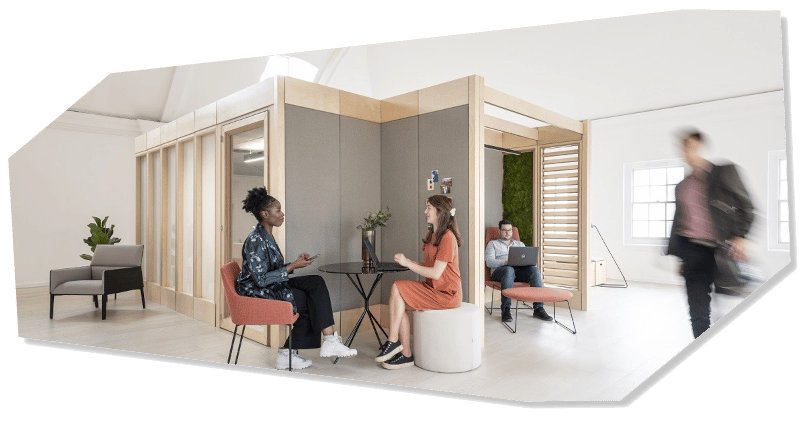The events of the pandemic have permanently changed how and where we work
In truth, the impact of Covid has served to accelerate a shift in ways of working that was already underway. For knowledge-based industries, the move away from traditional office-based working has been gaining momentum over recent years, as businesses recognise the benefits of enabling people to work where and how best fits the organisation and its people.
For those businesses that were lagging the curve, being forced to adopt work-from-home practices in March 2020 provided the push they needed to realise the many benefits of a more agile, flexible way of working.
In June 2020, Facilities Management Journal covered estimations that demand for UK office space could drop by up to 50%. The report also forecast that up to half of the office-based population would eventually embrace remote working. Two years later, it looks like this prediction was largely accurate.
As workforces adjusted to working from home, office occupancy levels dropped. Desks remained unused and entire floors of offices became vacant. Companies began to recognise the value of implementing flexible working strategies, and most are still offering hybrid working options.
The cost of unused office space
With employees working outside of the office, it’s estimated that UK companies waste £10 billion each year on surplus office space. There are now even plans set out by the City of London Corporation to turn unoccupied office space into 1,500 residential homes by 2030.
As the ways we interact with our places of work continue to shift, many businesses have been re-thinking their approach to space utilisation and real estate expenditure.
From a commercial perspective, tapping into unused office space enables companies to maximise the impact of their assets. There’s potential to generate a profit by repurposing the space they no longer need.
Repurposing your surplus office space for profit
It’s time to consider how to make the most of your surplus office space. There are lots of ways of repurposing extra office space to develop a profitable solution.
- Take advantage of the evolving role of the office
- See ‘grey space’ as an opportunity, not a burden
- Optimise your excess office space by subletting
- Transform your grey space into attractive offices
- Work with property agents to achieve ideal outcomes
- Make the most of the design and build process
If your business has been left with excess office space due to evolving working patterns, our series of blogs will help you explore some of the solutions.
How office space requirements are shifting
The unpredictable nature of events we’ve experienced over the past few years have naturally had a considerable impact on the way we work. Here’s how we’ve seen office space requirements evolve – and how you can tap into these changes in ways that work in your favour.
Working from home and the pandemic
The pandemic and resulting lockdowns dramatically increased the number of UK employees working from home. Only 5.7% worked from home in January 2020. The Office for National Statistics found that in the peak of lockdown in June 2020, 49% of UK employees were working from home.
Investing in remote working
Companies have had to invest billions in solutions that helped facilitate the unexpected shift to remote working, including:
- Office equipment, hardware, and tech to take home
- Training sessions
- Employee monitoring software
- Relocation salary adjustments or subsidisations
- Wellbeing programmes
- Increased HR expenses
- Cloud network and storage updates
- Contributions to home Wi-Fi and phone bills
Although there is an initial expenditure for companies implementing these changes, remote working offers the opportunity to reduce real estate costs. Adjustments made to ensure productive, effective remote working are also still proving beneficial for many companies. As the prevalence of remote working continues, these investments are now paying off.
This gives businesses more flexibility in adapting their working environments and policies – especially as we’re noticing an increasing shift towards co-working and agile working.
Offices remain central to company operations
While it’s clear our requirements surrounding office space have changed, a Q4 2021 survey into the UK Commercial Property Market by RICS stated that 66% participants felt office space was still necessary for a company to operate successfully.
Most offices are still central to business. Having a dedicated workplace enhances the sense of community involved in working as part of a company, in particular providing the opportunity to communicate and collaborate face to face. This can have a big impact on employee morale, which in turn impacts engagement and people performance.
Due to the continued integral role of the office, companies are faring best when they work to downsize, or optimise their space – not when they eradicate access to the office entirely.
The overflow of grey space
‘Grey space’ refers to unused, excess office space that tenants can’t give back due to ongoing lease terms. There was a 106% increase in the amount of grey space over just 12 months during the pandemic. The intensifying imbalance between required office space and grey space means companies are wasting increasing amounts of money on unused real estate.
Rather than continuing to lose money on this excess space, it’s worth thinking about how it could be successfully repurposed.
In our next blog, we’ll explore some of the solutions available when you have surplus office space on your hands.
Office workspace can help you optimise your office footprint
At Office Workspace, we’re experts in developing modern office spaces that enhance productivity, creativity and collaboration while reducing costs.
As a multi-generational, family-owned business, we’ve refined our methodology over the years to provide our clients with best-in-class solutions, services and support. As attitudes to the workplace evolve, so do we, and this is reflected in our approach to workspace design. Fusing data-led practicality with our unwavering creative vision, our workspace developments are designed for success.
If you’d like to discuss how our office space solutions could work for you, please call our team on 020 8309 0000. Alternatively, you can get in touch via our online contact form.

